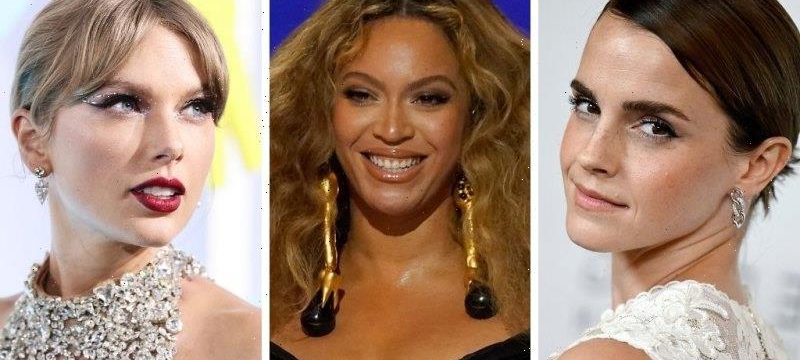I care about the environment, which is why I fly private, use more than 100,000 gallons of my allocated water during a crippling drought, have a pantry that looks like the snack aisle of your local IGA, and partner with a fast fashion giant to sell low-quality, non-recyclable clothes at an unreasonably low price point.
I’m a feminist, and you can tell by all the photos I post surrounded by women a tiny bit uglier than me and refute any criticism by asking if you’d be asking me this if I was a man.
I’m an LGBTQI+ ally, OK? I go to drag brunch like, twice a year.
From left: Emma Watson, Beyonce and Taylor Swift are just some of the celebrity activists.Credit:AP, Getty Images
Activism is hot right now. More than that, it’s a necessity. As an audience, we are no longer satisfied with a product or service. We don’t want our entertainers to stay politically neutral. We can’t – we refuse to – separate the art from the artist. When consumers are drowning in options and one person’s cancellation is another’s great opportunity, we demand our celebrities, CEOs, brands and products all have an outspoken conscience.
Altruism? In my capitalist hellscape?
Enter performative activism. It’s Taylor Swift releasing a song during pride month that loosely connects allyship with people being mean to her online. It’s Emma Watson making gender equality palatable for men. It’s a game show funded by a major television network that makes people compete with one another to raise money for their causes. It’s companies adding rainbow colours to their logos one month a year, it’s a black square on your Instagram feed during Black Lives Matter protests, it’s plastic bottles in cardboard containers being marketed as sustainable.
Call me cynical, or unrelentingly woke and habitually unimpressed, but I struggle to be surprised when brands and public figures wield activism as a marketing tool. It’s the ultimate trick: do the bare minimum and get praised. Turn it into a product, flog it, then personally benefit from ongoing global crises without doing all that much to solve them.
Illustration: Robin Cowcher.Credit:
It’s not like this isn’t talked about. There is backlash in the form of think-pieces and Twitter takedowns. But it’s a loop: Beyonce singing a working-class anthem still gets the clicks, streams and profits she was aiming for all along. She goes back to her TriBeCa penthouse to bathe in Bollinger, and the people she’s singing to – and about – get fired for unionising. What is the point of her allyship if it isn’t backed up by action?
This isn’t to say that indifference is preferable; we know that neutrality in the face of injustice is a vote for the oppressor. We also know that our political consciences shouldn’t be guided by a press release written by a PR team. Still, it’s condescending, even nauseating, to be fed that eternally infuriating material adage: to do as they say, not as they do.
Can’t the himbo just exist, sexily, for our viewing pleasure? … Why do we think we’re entitled to role models?
We need to hold public figures accountable for their hypocrisy. With so many talented, articulate, motivated people waiting impatiently in line for their 15 minutes, we don’t have to settle for lip service, and we shouldn’t.
OK, but does anyone with a hint of renown owe it to the public to use their platform to make the world a better place? Can’t actors just act? Can’t the himbo just exist, sexily, for our viewing pleasure without being forced to offer commentary on the perpetuity of unrealistic beauty standards? Why do we think we’re entitled to role models?
If nothing else, we all owe it to one another not to actively make the world worse.
Look, there’s nothing inherently wrong with being uninformed. There’s nothing wrong with doing your best, messing up, and trying harder next time. That’s the human experience we’re all doomed to repeat regardless of our follower count.
Celebrities don’t have to solve climate change, but they also don’t have to shill landfill-bound products to the gullible masses. Executives don’t have to chair gender equity committees, but they could do something about rampant internal sexual harassment. Lingerie brands are not responsible for fighting body dysmorphia one stretch mark at a time, but putting a size 12 model on a poster doesn’t make them champions of body diversity.
If they don’t have anything of value to add, they could simply opt out of the conversation around social progress and admit what we all know to be true: that they, like all of us, are just hustling towards the next tax (artfully dodged) tax bracket? To be dumb and do better; to do more by doing much, much less. The whole world would be better for it.
The Opinion newsletter is a weekly wrap of views that will challenge, champion and inform your own. Sign up here.
Most Viewed in Culture
From our partners
Source: Read Full Article


